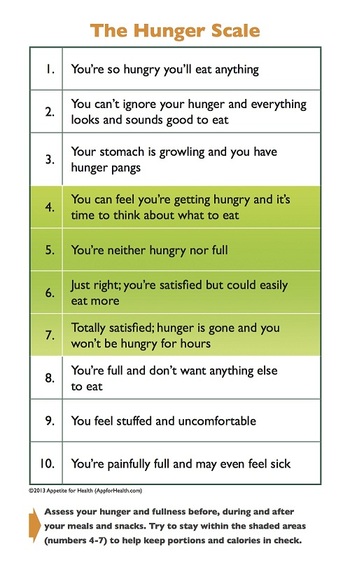When is the last time you ate so much you felt stuffed or uncomfortable? Was it Thanksgiving or does it happen more often? Take a look at the attached Hunger Scale. 
How often do you think you reach levels 8-10? I bet most people don't get to the point of feeling sick too often; but feeling a little uncomfortable or stuffed might happen more frequently. For me, it usually happens when I find myself looking forward to a certain meal or when I get too hungry. In these situations, I am literally setting myself up for failure - which in this case is not being mindful. No one would argue that when we eat until we feel stuffed or to "painfully full" we have eaten more calories than we needed. If this happens often enough, it can certainly sabotage weight loss or weight control efforts.
The Center for Mindful Eating defines mindful eating as "... using all your senses in choosing to eat food that is both satisfying and nourishing to your body .... And becoming aware of physical hunger and satiety cues to guide your decisions to begin and end eating."
My last post was focused on being more mindful in the decision to start eating. The focus today is on the other end. What is your answer to the question, "When do you stop eating?" I think a lot of adults would say "because the food is gone." I don't hear a lot of answers like: "Because I am totally satisfied" or "Because I am listening to my body and it is telling me I am a seven out of ten on the Hunger Scale." Okay, so that is a bit ridiculous but isn't it possible most of us don't really listen to our internal cues and eat beyond what we need? Babies and kids seem to have this one figured out.
I remember not understanding why one day my baby would nurse for five minutes and the next day for twenty minutes. Or my toddler, who for days would just take bites to the point of worry, all of a sudden asks for more. Babies and kids listen to their internal cues and stop eating when they are satisfied or as my little ones described it - when their tummies are full.
I like to use the word, "satisfied" instead of "full" because to me it is a bit more descriptive. The word full is like a pain scale - very subjective. Full as a definition means "having as much as possible," and when following this when it comes to eating, that is too much. You may have heard someone recommend stopping eating when you are 80 percent full as a guide to controlling food intake. I like this idea because it prompts thoughtfulness about your own definition or feeling of fullness and promotes you to be mindful enough to stop before that. The hunger scale uses some words I like as well - "neither hungry nor full." - That makes me pause and feel like I eat much more than I think I do.
It takes time to feel satisfied - SLOW DOWN
I know I am telling you nothing new when I say it takes time for your brain to send those signals to your tummy telling you that you are satisfied - 15 to 20 minutes is the length of time most agreed upon. Many of us are done well before that. So if you have eaten in less than that time you have certainly stopped for other reasons (likely because the food is gone) than listening to your body. If this is the case, you most often will feel that fullness a bit later and you will likely feel like those descriptions in level 8-10 on the Hunger Scale. In this situation, you have consumed extra calories and may even feel some sort of guilt.
Being mindful about when to stop eating takes practice and intention - at least at first. Make efforts to slow down by putting your fork down between bites or taking lots of water sips. Enjoy conversation with the people you are with - this is especially true for the holiday season when you are seeing folks you don't see on a daily basis. Try not to eat in front of a television or a screen and practice dishing at the kitchen counter and dining at the table. I have even told people to leave a bite or two of food on their plate - just for the practice of being honorably discharged from the "Clean Plate Club." Playing peaceful music, dimming the lights and lighting a candle are things you can do to help to slow down and appreciate the eating experience.
If you practice mindful eating, with both the decision to eat and the decision to stop, you will feel better, enjoy your food more, eat less and likely shed pounds. Said that way, it sounds like a gimmicky diet plan. However, mindful eating is a learned behavior that, just like exercise, is an intentional effort that becomes routine or habit. These habits will add up to create a healthy lifestyle for a life-long happier you.